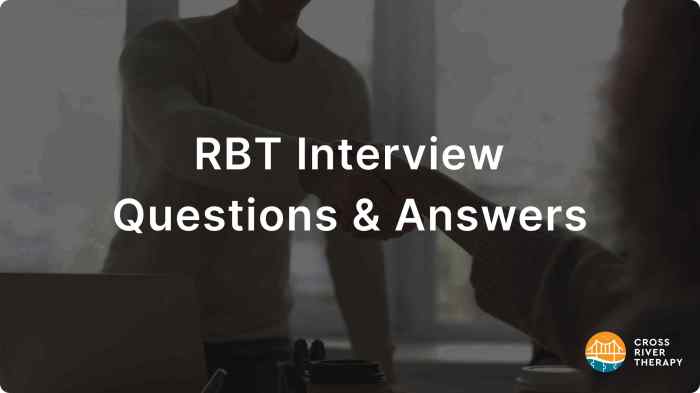An RBT may use the results of an interview to gather meaningful information, make informed decisions, and develop effective interventions. This article explores the ethical considerations, interviewing techniques, data analysis methods, documentation practices, and case study applications related to using interview results in RBT practice.
Interviews provide RBTs with valuable insights into the client’s history, current functioning, and support system. By understanding the client’s perspective and experiences, RBTs can tailor interventions that are individualized and responsive to their needs.
Interview Results Usage in RBT

Interview results play a vital role in RBT practice, providing valuable information to inform decision-making and intervention development.
Interviews can uncover:
- Client’s history, experiences, and goals
- Family and environmental factors
- Behavioral patterns and challenges
Ethical Considerations
RBTs must adhere to ethical guidelines when using interview results.
Key considerations include:
- Obtaining informed consent before conducting interviews
- Maintaining confidentiality and protecting client information
- Avoiding biases and ensuring objectivity in data interpretation
Interview Techniques
Effective interviewing techniques enhance data quality.
RBTs should:
- Establish rapport and build trust
- Ask open-ended questions
- Actively listen and clarify responses
Data Analysis and Interpretation
RBTs analyze interview data to identify patterns and draw inferences.
Methods include:
- Thematic analysis
- Content analysis
- Narrative analysis
Bias avoidance is crucial during interpretation.
Documentation and Reporting
Accurate documentation is essential for accountability and continuity of care.
Best practices include:
- Recording all interview details (date, participants, questions asked)
- Summarizing key findings and interpretations
- Storing documentation securely and confidentially
Case Study: Interview Results Application, An rbt may use the results of an interview
In a case study, an RBT used interview results to develop an intervention plan for a client with challenging behaviors.
The interview revealed:
- The client’s history of trauma and neglect
- The client’s difficulty regulating emotions
- The client’s strong desire to improve
Based on this information, the RBT developed an intervention plan that included:
- Trauma-informed care strategies
- Emotion regulation techniques
- Goal-setting and progress monitoring
The intervention was successful in reducing the client’s challenging behaviors and improving their overall well-being.
Clarifying Questions: An Rbt May Use The Results Of An Interview
What are the ethical considerations related to using interview results in RBT practice?
RBTs must obtain informed consent from clients or their legal guardians before conducting interviews. They must also maintain confidentiality and protect the privacy of the information gathered.
What are some effective interviewing techniques that RBTs can use?
RBTs can use open-ended questions, active listening, and rapport-building techniques to gather meaningful information from clients.
How can RBTs analyze and interpret interview data?
RBTs can use qualitative and quantitative data analysis methods to identify patterns, draw inferences, and avoid biases in their interpretations.


